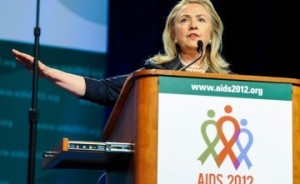Africa: Clinton Begins Visit to Africa, As Jonathan’s Absence Stalls Nigerian Leg
 United States Secretary of State, Hillary Clinton, on Tuesday began a 10-day trip to Africa, with stops in Senegal, Uganda, Kenya, South Sudan, Malawi and South Africa, where she is expected to meet visit to the continent’s elder statesman, 94-year-old anti-apartheid icon Nelson Mandela.
United States Secretary of State, Hillary Clinton, on Tuesday began a 10-day trip to Africa, with stops in Senegal, Uganda, Kenya, South Sudan, Malawi and South Africa, where she is expected to meet visit to the continent’s elder statesman, 94-year-old anti-apartheid icon Nelson Mandela.
During her visit, Clinton would meet with leaders of those countries, in what a statement by the State Department said would be, “to emphasize US policy commitments outlined in the Presidential Policy Directive – to strengthen democratic institutions, spur economic growth, advance peace and security as well as promote opportunity and development for all citizens.”
Though Nigeria was not listed among the countries she would be visiting, the Nigerian Ambassador to US, Prof. Adebowale Adefuye, on Monday night confirmed to THISDAY that Clinton would be visiting Nigeria.
Adefuye said the US Secretary of State was initially billed to visit Nigeria on August 2, but a new date was being worked out because of the longstanding commitment of President Goodluck Jonathan to attend Jamaica’s Independence anniversary celebration, and Trinidad and Tobago Emancipation Day.
President Jonathan departed Abuja on Tuesday and would among other activities lined up for his visit, review the Kambule Street Procession in Trinidad and Tobago, and attend a special commemorative session of parliament in his honor in Jamaica before returning to Abuja on Saturday.
Also, sources at the State Department told THISDAY that Clinton’s visit to Nigeria would still be incorporated into the 10-day African trip once a convenient date for both sides had been worked out.
State Department sources had last weekend told THISDAY that Clinton would be visiting Nigeria early August but government of both countries were still harmonizing details of the visit.
Clinton had visited Nigeria in August 2009, during which she urged the nation to embrace broad political reform, tackle corruption and ease tensions that had led to sectarian violence and disrupted oil production in the Niger Delta.
Obama laid out his policy for Africa in a speech in Ghana in July 2009, saying the United States stood ready to help African nations as they work to improve governance, fight corruption and resolve regional conflicts.
His speech led to widespread hopes on the continent that the first U.S. president with African roots would follow through with new policies to help achieve those goals.
But his administration has not launched major new initiatives such as the Clinton-era trade pact that granted tax breaks to African goods or President George W. Bush’s AIDS initiative of 2003, which committed billions of dollars to the fight against HIV/AIDS on the continent.
“Africans will always see Obama as one of our own, so we are reluctant to criticize,” said Mwangi Kimenyi, a Kenyan academic and director of the Africa Growth Initiative at the Brookings Institution.
“But it turns out our expectations for the president were a bit overrated and unrealistic. He could have been more courageous and done more.”
The White House last month released a policy paper on Africa, repeating its commitment to strengthening democracy and spurring economic growth but lacking a single signature project which could cement Obama’s Africa legacy.
Instead, attention has focused on AFRICOM, the unified U.S. Africa Command that the Pentagon established in 2007. It is playing an increasingly important role as the United States pumps resources into training African militaries.
“The security threats are becoming much more visible and in some ways dangerous than they were before,” said Jennifer Cooke, the head of the Africa program at the Centre for Strategic and International Studies in Washington.









